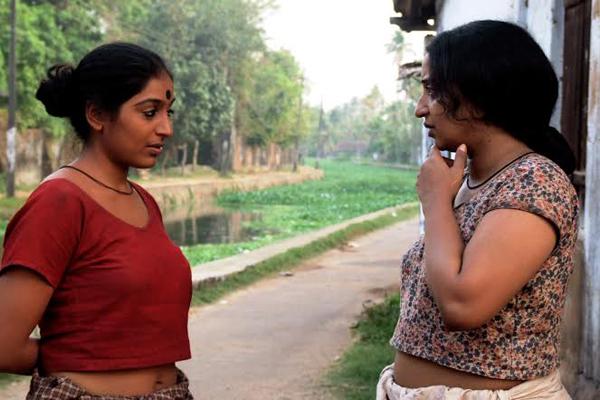 Image: Adoor Gopalakrishnan image by Vicharam Licensed under Creative Commons
Image: Adoor Gopalakrishnan image by Vicharam Licensed under Creative Commons
Adoor Gopalakrishnan: Such a Long Journey
NETPAC (Network for the Promotion of Asian Cinema) is bestowing the Lifetime Achievement Award to filmmaker Adoor Gopalakrishnan at the International Film Festival of Colombo this month for his contribution to cinema. The award comes at a time when Adoor has put in 43 years exclusively to filmmaking as a director and rightly considered as one without par on the Indian subcontinent. Shoma A. Chatterji explores his films and filmmaking.
Awards hardly make a difference to Adoor Gopalakrishnan who is more interested in cinema per se followed by his own process of filmmaking than in awards. He won the Dadasaheb Phalke Award in 2005 and many awards over his 43-year-old career in films. This time, it is another Lifetime Achievement Award bestowed on him by NETPAC, the largest and most powerful organization of filmmakers and critics in Asia and beyond. Netpac is a worldwide organization with membership of 29 countries founded in 1990 by Aruna Vasudev at the request of UNESCO to promote greater understanding and appreciation of Asian Films and filmmakers.
What do awards mean to him? “Awards are important particularly in the early days of one's career, because it tells you in some way that what you are doing is worthwhile. If there is appreciation and substantial recognition, it helps a filmmaker. Awards are a kind of understanding from others about your work. Yes, awards are very important. I was a little surprised to begin with because this award usually goes to a veteran. I do not consider myself to be a veteran. But it is a great honour and I look upon it as very satisfying and gratifying,” he says, smiling.
Adoor's reluctance to identify himself with an ideology, his explorations of the individual, often on a one-to-one basis that spans several layers of the human experience, his insistence on the autonomy of the form in cinema, distinguish him from most of his peers, and often make him a subject of controversy, principally because he belongs to Kerala, forever a volatile political state with polarized agendas preached and practiced by a segmented audience..jpg)
He has never compromised with market pressures or audience demands for mainstream entertainment. Yet, he has held on to his own language, style, approach, story and plot and is a name to reckon with on the map of International Cinema. He has made relatively few films during his long span as filmmaker. His first film Swayamvaram (1972) came ten years after he graduated from the FTII, Pune. It was the second Malayalam film after Chemeen to have won the National Award. Followed Kodiyettam (1979), Elipathayam (1981), Mukhamukham (1984), Anantaram (1987), Mathilukal (1989), Vidheyan (1993), Kathapurushan (1995, Nizhalkuthu (2002), Naalu Pennugal (2007) and Oru Pennum Randaanum (2008).
Adoor was born in the small Kerala town of Adoor in 1941. A graduate in political science, 'Adoor' joined the Film Institute in Pune in the early sixties; his first feature film, Swayamvaram, was made 10 years later and went on to become the second Malayalam-language film (after the path-breaking Chemeen, a decade earlier) to win the National Award.
“Filmmaking is not just about story telling. That's a minor excuse, a simple but significant excuse to keep an audience engaged in a cinema theatre,” he says.
“More than that, I am making them experience and also look for many things within and without themselves, and around themselves. I am talking about my kind of cinema. This, I think is the function of the art, any art for that matter -- to make you aware, to make you think and disturb you positively and creatively, to make you excited about it, to make you responsive to things.”
Adoor does not identify himself or his films with any agenda, political, cinematic, or otherwise. When this writer first met Adoor at the Hyderabad Filmotsav in 1986 and asked him what he does between films, since he makes so few of them, his pat answer was, "I think about making films," just like that.
During the making of Vidheyan, starring Mamooty in a negative role, he said, "I make my films for everyone. Not everyone may understand them in the same way, but that is something I crave for. I am no fireside raconteur. As a filmmaker, it is my duty to respect the audience's intelligence. They can understand a film the way they wish to. I try to be as cost-effective as I can. Vidheyan was planned at a cost of Rs.27 lakhs. I completed it within Rs.25 lakhs. I do not believe in going over-budget to stress a point."
Adoor's technique is brilliant, the most striking of which is his power of understatement and his ability to resist all temptations of surrendering to intellectual pretensions. In fact, his cinema does not demand any inner readings because each film stands by itself superbly even at face value.
.jpg) Understatement in craftsmanship is also one of the hallmarks of his films. Low-key natural lighting blends the characters into their rural milieu while the cinematography maintains the richness of the Kerala landscape without subjecting it ever to touristy, picture-perfect, postcard-like visual images.
Understatement in craftsmanship is also one of the hallmarks of his films. Low-key natural lighting blends the characters into their rural milieu while the cinematography maintains the richness of the Kerala landscape without subjecting it ever to touristy, picture-perfect, postcard-like visual images.
“I interact with the medium of cinema by choosing a human being placed in a certain situation. It may be a village simpleton, a disillusioned political worker or a writer as the case may interest my creative instincts and me. It is their existential situation that my film explores. None of this can be summed up through a slogan," he elaborates.
In a much understated way, his films deal with human 'absences' and sometimes, small 'presences' that mark that vital difference between Adoor and other filmmakers.
Mathilukal for instance, has no female presence though the female character is very much present across the wall, with her sensuous voice breaking the barrier of the wall that separates her from her 'lover' on the other side. In Vidheyan, the Patel's wife, played by Tanvi Azmi, appears briefly but leaves a strong impact. In Kathapurushan, through his absence, the affluence and the dictation of Kunjunni's father are strongly underscored.
His films have been exhibited at every film festival in the world; his third, Elipathayam, won the Most Original Film award from the prestigious British Film Institute in 1982. He won the coveted International Film Critics Prize for five successive films; in 1983, he was accorded the Padma Shri and many more over time. The NETPAC Award finds itself honoured by the awardee the board has chosen instead of it being the other way round.
(Image: Adoor Gopalakrishnan image by Vicharam Licensed under Creative Commons)
Top Headlines
-
Entertainment
Bollywood 2025: Hits, Hype and Heartbreaks as Dhurandhar Redefines the Year
December 24, 2025
-
Entertainment
Rotary Club of Calcutta East Central celebrates centenary of iconic actor Santosh Dutta with statue unveiling
December 04, 2025
-
Entertainment
Valentyn Vasyanovychs To The Victory! wins 2025 TIFF Platform Award unanimously
September 26, 2025
-
Entertainment
Chlo Zhaos Hamnet Wins TIFF 2025 Peoples Choice Award
September 20, 2025
-
Entertainment
Sholay: Golden even after fifty years
July 04, 2025
-
Entertainment
War 2: Check out Hrithik Roshan, Jr NTR and Kiara Advani's new posters
June 26, 2025
-
Entertainment
LGBTQIA+: Icelandic film Odd Fish and Brazil's Baby win big at KASHISH 2025 film festival
June 12, 2025
-
Entertainment
Katrina Kaif named Maldives tourism global brand ambassador ahead of Modi's visit
June 10, 2025
-
Entertainment
'Queen marches to conquer': Deepika Padukone joins Atlee's AA22xA6 starring Allu Arjun after 'Spirit' exit
June 08, 2025
-
Entertainment
Dakota Johnson and Chris Martin, who were in on-and-off relationship, broke up: Reports
June 06, 2025


